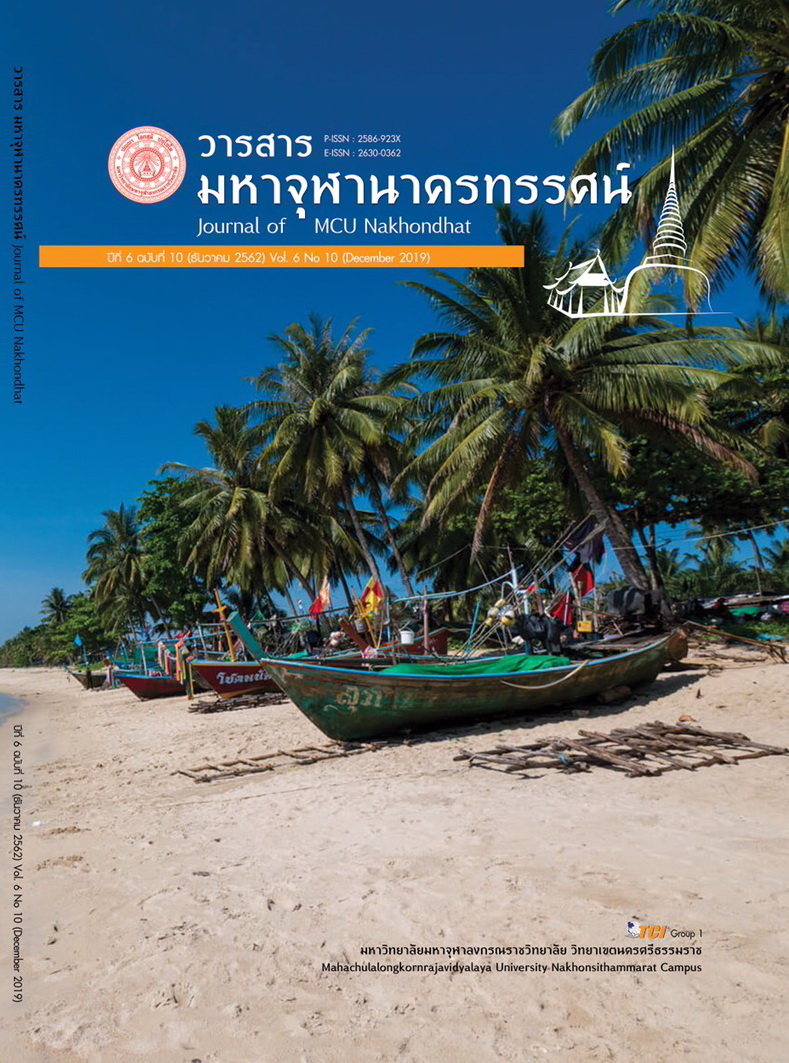THE MODEL FOR THE DEVELOPMENT OF THE CORE COMPETENCIES OF GOVERNMENT TEACHERS ACCORDING TO THE BUDDHA DHAMMA OF SCHOOLS UNDER THE PHITSANULOK PRIMARY EDUCATIONAL SERVICE AREA OFFICE
Main Article Content
Abstract
The purposes of this study were as follows: 1) to study the core competencies of government teachers under the Phitsanulok primary educational service area office 2) To create the model for development the core competencies of government teachers according to Buddha Dhamma of school under the Phitsanulok primary educational service area office 3) to evaluate the model for development the core competencies of government teachers according to Buddha Dhamma of school under the Phitsanulok primary educational service area office , and 4) to study the form and new knowledge for performance improve core competencies of government teachers according to Buddha Dhamma. This was mixed methods research by data analysis and semi-structured interview. A sample was selected from 25 persons who had an experienced representative in development the core competencies of government teachers according to Buddha Dhamma of school under the office of the permanent secretary ministry of education of Phitsanulok province by specific selection, also using the analytical study process to lead the integration and creating model for development the core competencies of government teachers according to Buddha Dhamma. To create integration model and new knowledge for performance improve core competencies of government teachers according to Buddha Dhamma.
The study found that:
- The core competencies of government teachers under the office of the permanent secretary ministry of education of Phitsanulok province that can be divided into 5 aspects such as 1) focusing on work achievement 2) service mind 3) self development 4) team work and 5) morality and teacher’s ethic.
- The model for development the core competencies of government teachers according to Buddha Dhamma of school under the office of the permanent secretary ministry of education of Phitsanulok province such as seven Sappurisa-dhamma (virtues of a gentleman) 2) four sublime states of mind and 3) four Iddhipada (basic for success).This all be a guideline for integration between job development and human development.
- The evaluation of the model for development the core competencies of government teachers according to Buddha Dhamma of school under the office of the permanent secretary ministry of education of Phitsanulok province found that the model is possible for practice on highest level (
=4.27) inferior, the format is accurate on highest level (
=4.26), the format is appropriate on highest level (
=4.25) and the format is useful on highest level (
=4.13)
- The model and new knowledge for development the core competencies of government teachers according to Buddha Dhamma such as to apply Kanlayanatham 7 that mean the teachers must be aware of the responsibility for being a teacher, knowledge and understanding in various subject processes was necessary, communicate techniques and being a good role model for student that include with 1) Piyo (lovely) 2) Karu (respectful) 3) Phawaniyo (delightful) 4) Watta (know how to speak) 5) Wachakhamo (endure) 6) Khumphirunja Kathung Kutta (understanding) and 7) Noo Jukthane Niyochaye (induce to good way)
Article Details
References
กลุ่มนโยบายและแผน สำนักงานเขตพื้นที่การศึกษาประถมศึกษาพิษณุโลก เขต 1. (2560). หน้าที่กำกับดูแลโรงเรียนสำนักงานเขตพื้นที่การศึกษาประถมศึกษาพิษณุโลก. ใน รายงานประจำปี 2560. เอกสารลำดับที่ 10 /2560. สำนักงานเขตพื้นที่การศึกษาประถมศึกษาพิษณุโลก เขต 1.
กลุ่มนโยบายและแผน สำนักงานเขตพื้นที่การศึกษาประถมศึกษาพิษณุโลก เขต 2. (2560). หน้าที่กำกับดูแลโรงเรียนสำนักงานเขตพื้นที่การศึกษาประถมศึกษาพิษณุโลก. ใน รายงานประจำปี 2560. เอกสารลำดับที่ 10 /2560. สำนักงานเขตพื้นที่การศึกษาประถมศึกษาพิษณุโลก.
กลุ่มนโยบายและแผน สำนักงานเขตพื้นที่การศึกษาประถมศึกษาพิษณุโลก เขต 3. (2560). หน้าที่กำกับดูแลโรงเรียนสำนักงานเขตพื้นที่การศึกษาประถมศึกษาพิษณุโลก. ใน รายงานประจำปี 2560. เอกสารลำดับที่ 10 /2560. สำนักงานเขตพื้นที่การศึกษาประถมศึกษาพิษณุโลก.
ฐิติพงษ์ ตรีศร. (2547). สมรรถนะการปฏิบัติงานของครูในสถานศึกษา สังกัดสำ นักงานเขตพื้นที่การศึกษาเพชรบูรณ์ เขต 3. ใน วิทยานิพนธ์ครุศาสตรมหาบัณฑิต สาขาวิชาการบริหารการศึกษา. มหาวิทยาลัยราชภัฏเทพสตรี.
นันท์นัทธฉัตร ศรีวิเศษ. (2558). การประยุกต์ใช้หลักพุทธธรรมในการปฏิบัติงานของผู้บริหารและครูใน สถานศึกษาขั้นพื้นฐาน สังกัดสำนักงานเขตพื้นที่การศึกษาประถมศึกษากาญจนบุรี เขต 2. ใน วิทยานิพนธ์ครุศาสตรมหาบัณฑิต สาขาวิชาการบริหารการศึกษา. มหาวิทยาลัยราชภัฏกาญจนบุรี.
บัณฑิต ฉัตรวิโรจน์. (2540). การพัฒนารูปแบบการจัดการเรียนการสอนแบบการจัดความรู้เพื่อเสริมสร้างสมรรถนะการสอนของนักศึกษาครู. ใน วิทยานิพนธ์ครุศาสตรดุษฎีบัณฑิต สาขาวิชาอุดมศึกษา. จุฬาลงกรณ์มหาวิทยาลัย.
พระมหาอุดร อุตฺตโร (มากดี). (2557). สมรรถนะการปฏิบัติงานของครูสำนักเรียนพระปริยัติธรรม แผนก บาลี ตามหลักกัลยาณมิตร. ใน วิทยานิพนธ์พุทธศาสตรดุษฎีบัณฑิต สาขาวิชาพุทธบริหารการศึกษา. มหาวิทยาลัยมหาจุฬาลงกรณราชวิทยาลัย.


